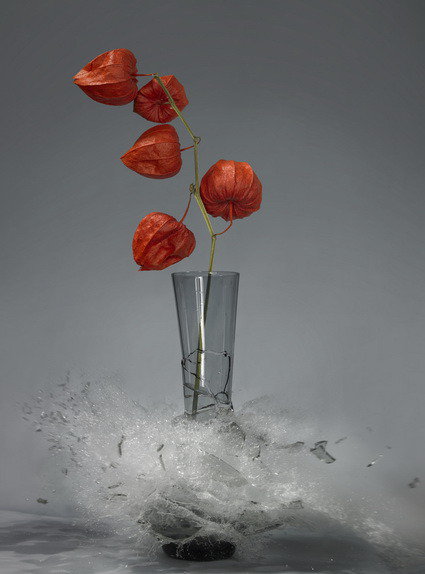Flowers - Contemporary Photography
dal 30/6/2011 al 1/10/2011
Segnalato da
Jessica Backhaus
Wilfried Bauer
Andrea Baumgartl
Frauke Eigen
Amin El Dib
Stephan Erfurt
Fischli & Weiss
Thomas Florschuetz
Jean-Baptiste Huynh
Martin Klimas
Sofia Koukoulioti
Vera Mercer
Holger Niehaus
Christian Rothmann
Miron Schmuckle
Luzia Simons
Margriet Smulders
Michael Wesely
30/6/2011
Flowers - Contemporary Photography
Alfred Ehrhardt Stiftung, Berlin
Presenting the exemplary work of 18 international artists and photographers, the exhibition brings together a great variety of approaches within contemporary flower photography. The artists are joined by a deep fascination for flowers and their manifold meanings as well as an attempt to relate this traditional topos to the present. Works by Fischli & Weiss, Thomas Florschuetz, Jean-Baptiste Huynh, Martin Klimas, Sofia Koukoulioti, Vera Mercer...

With photographs by Jessica Backhaus, Wilfried Bauer, Andrea Baumgartl, Frauke Eigen, Amin El
Dib, Stephan Erfurt, Fischli/Weiss, Thomas Florschuetz, Jean-Baptiste Huynh, Martin Klimas, Sofia
Koukoulioti, Vera Mercer, Holger Niehaus, Christian Rothmann, Miron Schmückle, Luzia Simons,
Margriet Smulders, Michael Wesely.
Beauty and transience, love and death. Hardly a living thing is used more frequently to symbolize
these themes than the flower—even contemporary photographers repeatedly take up this century-
old motif. For this reason the Alfred Ehrhardt Foundation is introducing its first exhibition to survey
this theme. Presenting the exemplary work of 18 international artists and photographers, this
selection brings together a great variety of approaches within contemporary flower photography.
The artists are joined by a deep fascination for flowers and their manifold meanings as well as an
attempt to relate this traditional topos to the present.
Flower photographs have been part of the history of photography since the pioneering phase of the
medium—usually within a context ranging from taxonomy to erotic imagery and studies of nature
and materials. More recently, the motif has been a point of departure for new and experimental
perspectives on the subject. Flower vases are shot through and documented at the moment of their
destruction. Blossoms are painted over. Flower stalks and stamen are used for sexual innuendo.
Flowers are shown in nature, in the process of drying, wilting, or rotting away; they are scanned or
arranged as opulent bouquets.
Sometimes we are immersed in an illusionistic visual realm, and sometimes we are confronted with
a puristic visual stringency, but the fundamental tone is that of vanitas. More than almost any
other flower, the rose represents the dualism of love and death, for example through its symbolic
significance as an “eternal bond” between to lovers, even beyond death—and thus this motif also
appears in a number of works exhibited. Within the symbolic mélange of love, innocence, and
transience the rose is repeatedly also associated with the Virgin Maria, as in the depictions from
previous centuries, which show the biblical figure in a rose garden. According to an old legend,
roses had no thorns before the Fall of Man, and given that Maria was free of Original Sin, there
emerged the visual type of the “Rose Madonna,” who could not be harmed by the flower’s thorns.
In contrast, the red color of the flower also makes reference to the Passion of Christ. Among the
ancient gods, Aphrodite, or Venus, was considered a rose goddess; her rose grew from her own
tears shed for Adonis, her murdered lover. One might say that out of Aphrodite/Venus came the
heavenly Maria, who is still associated with the motif of the rose, also through the prayer of the
rosary.
Historically, different types of flowers such as lilies and tulips, have been linked to comparable
symbolic meanings–through the intentions of artists as well as later interpretations of the images.
Flowers and blossoms, also those of grasses and trees, appear in highly varied contexts within
contemporary photography. The compositions have a delicate force that is compelling in the
conveyed sense of narcissism and vulnerability, the use of reduction and opulence, the exposure of
a millisecond or that lasting several days. They bring to light what we have forgotten to see or
cherish: natural beauty and its visual power.
The accompanying publication Flower Power, ed. Matthias Harder, DuMont, Cologne 2010 is
available for purchase during the exhibition.
Project-related press work:
artpress – Ute Weingarten
Elisabethkirchstr. 15 10115 Berlin
Tel: +49-(0)30-21 96 18 43
E-Mail: artpress@uteweingarten.de
Image: Martin Klimas
Press preview: Friday, July 1, 2011, 10 am to 1 pm
Opening: Friday, July 1, 2011, 7 pm
Opening Talk at 8 pm: Dr. Matthias Harder, curator of the exhibition
The curator and some of the artists will be present.
Alfred Ehrhardt Foundation
Auguststr. 75 - Berlin
Opening Hours: Tues – Sun 11 am – 6 pm; Thurs 11 am – 9 pm



